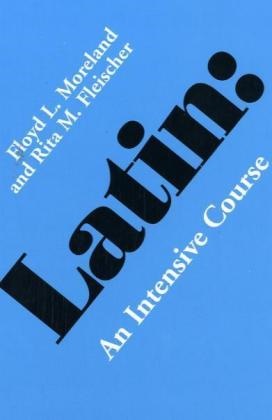Read more
Zusatztext "[Teachers] more concerned with no-nonsense thoroughness will not be disappointed." Klappentext "The best Latin text now available and I very much doubt that a better one will appear for a long time."—Ralph W. Johnson, Cornell University Zusammenfassung This is a comprehensive introduction to Latin forms and syntax, designed to train the student in reading ancient texts at an early stage. Inhaltsverzeichnis Preface to the Preliminary Edition Preface to this Edition INTRODUCTION A. The Alphabet and Pronunciation B. Syllabification C. Accentuation D. Word Order ABBREVIATIONS USED IN THIS BOOK GRAMMATICAL REVIEW A SELECTED GLOSSARY OF IMPORTANT TERMS UNIT ONE A. The Verbal System B. The Tenses of the Indicative C. The Infinitive D. The Four Conjugations E. The Principal Parts F. The Present Active Indicative System of the First Two conjugations G. The irregular Verb sum , 'be' H. The Noun System I. The First Declension UNIT TWO A. The Perfect Active Indicative System of All Verbs B. The Subjunctive Mood C. Formation and the Subjunctive D. Present Subjunctive of the Verb sum E. Conditional Sentences F. Genitive with Verbs of Accusing and Condemning UNIT THREE A. Nouns of the Second Declension B. First-Second Declension Adjectives C. Noun-Adjective Agreement D. Adjectives Used as Nouns E. Ablative of Means (Instrument) F. Ablative of Manner (Modal Ablative) G. Clauses of Purpose; Sequence of Tenses H. Indirect Commands UNIT FOUR A. The Present Active System of All Four Conjugations B. The Present Passive System of All Four Conjugations C. The Perfect Passive System of All Four Conjugations D. Review of Verb Conjugations E. Ablative of Personal Agent REVIEW: UNITS ONE TO FOUR UNIT FIVE A. Participles: Definition and Formation B. Some Uses of the Participle C. Periphrastics D. Dative of Agent with the Passive Periphrastic E. Dative of the Possessor F. The Verb possum , 'be able' G. Complementary Infinitive UNIT SIX A. Nouns of the Third Declension B. Infinitives C. Indirect Statement: Subject Accusative and Infinitive D. The Irregular Noun vis E. Ablative of Separation F. Accusative of Place to Which G. The Locative Case UNIT SEVEN A. Demonstrative Adjectives B. Personal Pronouns C. Possessive Adjectives D. Relative Pronoun E. Interrrogative Adjective F. Interrogative Pronoun G. Ablative of Accompaniment H. Ablative of Time When or Within Which I. Accusative of Duration of Time and Extent of Space J. Subjunctive in Subordinate Clauses in Indirect Statement UNIT EIGHT A. Adjectives of the Third Declension; Present Participles B. Fourth Declension Nouns C. Fifth Declension Nouns D. Ablative of Respect (Specification) E. The Irregular Verb eo , ire , 'go' F. The Present Imperative G. The Vocative Case H. Datives of Purpose (Service) and Reference: The Double Dative Construction REVIEW: UNITS FIVE TO EIGHT UNIT NINE A. Comparison of Adjectives B. Irregular Comparison of Adjectives C. Comparison with quam ; Ablative of Comparison D. Ablative of Degree of Difference E. Adverbs and Their Comparison F. Irregular Comparison of Adverbs G. Partitive Genitive UNIT TEN A. Ablative Absolute B. Adjectives with Genitive Singular in -ius C. Ablative of Cause D. Ablative and Genitive of De...

